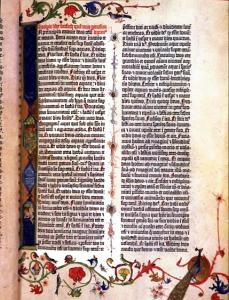 The historical complexity of the books and lives of Ezra and Nehemiah, the former a priest and the latter a building foreman and erstwhile governor of a rebuilding Judah in the 5th-4th century BCE, has been the subject of numerous reconstructions by scholars. Suffice it to say that consensus on these contested questions is highly unlikely. Still, it may be said that these two men, each perhaps resident in the Persian court, albeit some decades apart, were sent to Judah to perform crucial tasks as the Judeans attempted to reconstruct first the walls of Jerusalem and then to reinstall the ancient Torah of YHWH into the lives of the residents of the Holy City. For the purposes of this essay I will assume that Jerusalem’s walls have been fortified and at least partially rebuilt, leading to the cry of the people that Ezra, the priest, read for them the Torah in order that they may understand what their God has in mind for them to do in God’s special city.
The historical complexity of the books and lives of Ezra and Nehemiah, the former a priest and the latter a building foreman and erstwhile governor of a rebuilding Judah in the 5th-4th century BCE, has been the subject of numerous reconstructions by scholars. Suffice it to say that consensus on these contested questions is highly unlikely. Still, it may be said that these two men, each perhaps resident in the Persian court, albeit some decades apart, were sent to Judah to perform crucial tasks as the Judeans attempted to reconstruct first the walls of Jerusalem and then to reinstall the ancient Torah of YHWH into the lives of the residents of the Holy City. For the purposes of this essay I will assume that Jerusalem’s walls have been fortified and at least partially rebuilt, leading to the cry of the people that Ezra, the priest, read for them the Torah in order that they may understand what their God has in mind for them to do in God’s special city.
Exactly what this “Torah” may be is not at all clear. Is it the first five books of our Hebrew Bible, and if so, what form do those books take at this time in Judah’s history? Or is it more than that Pentateuch? Are there psalms? Does he read for them the vast story of the founding of the nation through the actions of Samuel, Saul, and David? Are Jonah and Ruth part of the reading? We can be sure that Daniel is not included, since that collection was not composed until at least two centuries later.
The reactions of the listeners that day near the Watergate may be instructive. They weep many tears as they hear the priest read, and though he urges them to rejoice at the recitation, tears remain as a part of their reaction. This may suggest that the demands of the law, or the commands of the prophets, force tears from their eyes as they recognize that they have not in fact followed these ancient dictates. In any case, just what was read that day will never be fully known. What can be known is the need that all the listeners have for interpretation of what they are hearing.
Those who are assembled before Ezra, who is standing on a raised platform, both men and women, are said to be able to “hear with understanding” (Neh.8:2). The word “understanding” is regularly used for “perception” or “insight”. Apparently, the community that came together on that first day of the seventh month—the usual time of the celebration of the Feast of Tabernacles or Booths—were prepared both to pay attention to what was read and to have insight into the meaning of the words for them. It has also been suggested that Ezra was reading the ancient text in Hebrew, while the assembled Judeans almost surely were speakers of Aramaic. Might the words “with understanding” then mean that interpreters were found to translate from one language to another? Though Hebrew and Aramaic are sister tongues, there are both significant grammatical and word differences that would make translation necessary, at least for some in the crowd.
However, that explanation may be called into question by the later claim of Neh.8:8: “So they read the book (note it does not say “he read,” but the verb is plural), from the Torah of God with interpretation.” The word translated in NRSV as “interpretation” usually means “to declare” or “make distinct.” Thus, are the people being helped to understand better what they are hearing/reading, or is the reading merely being read clearly, distinctly? Vs. 8 continues: “They gave the insight so that the people could perceive what was read.” The “they” of that sentence are the names of those who “helped the people to understand the Torah” found in Neh.8:7, the people staying in their places while they were being helped. Can we thus reconstruct this scene? Ezra reads the Torah of God, the assembled people of Judah listen attentively to his reading, but they are aided in their perception of what they are hearing by various uniquely qualified people who move among them helping them to understand better what they are hearing. Whether or not these helpers are translating the ancient words for the modern hearers as well as aiding their deeper comprehension of those words cannot be determined. It surely can be said, however, that the roving commentators are actively helping the listeners to understand for this new day in the rebuilt city what the ancient text means for them.
And, of course, so must it be for us modern hearers now. We simply must have help as we hear the ancient words if we are to apply those words to our own time and place. What this wonderful text says very clearly is that the Bible cannot be made understandable for successive generations without those well trained in the texts employed as helpers. And there we find the root of so many Bible blunders in our own time. Because we are the heirs of Martin Luther, whose vision was that everyone have direct access to the ancient text, unaided by the intercession of scholarly priests, his dream has been all too realized in the myriad fatuous readings of the Bible that dot the religious landscape in the 21st century. Monstrous readings of certain Bible texts have led too many to imagine that slavery is ordained, that LGBTQ persons are not welcome in churches, that capitalism is a mandate from God, that separation walls are needed between peoples to insure the safety and power of the few, that humans control the universe and may use and abuse their fellow creatures however they please to maintain that control, as God commands. 2400 years ago, it was recognized that Bible reading without careful help leads to disaster; how dreadfully true that has come to be.
If anyone can make the Bible say what she wishes it to say, to prop up some notion that she has determined God has commanded, the Bible becomes a book of terror rather than a book of hope and promise. Or, the Bible becomes a book that is useless, an old collection of myths and tales that can be ignored or made the butt of jokes, given over to a few foolish believers who refuse to grow up.
Just what are we to do, those of us who love the Bible and who continue to believe that it has much to teach us in our modern day? We must continue to play the role of Ezra’s helpers, moving among the assembled crowds, trying hard to “give the sense,” to provide the insight, so that the hearers may both weep and rejoice at the gifts that God continues to offer in the sacred texts. Such helpers are needed now more than ever as the Bible continues to be used for the rejection of many, causing deep pain for those whom God has created in God’s own image and likeness, those in short who are not like us, we powerful, comfortable ones who have for too long determined just who is “in” and who is “out”. Faithful interpreters are needed now to help and direct those who would abuse these great texts for their own nefarious purposes. I trust that those of you reading this will continue to be just those sorts of helpers. May their number be legion!
(Images from Wikimedia Commons)










